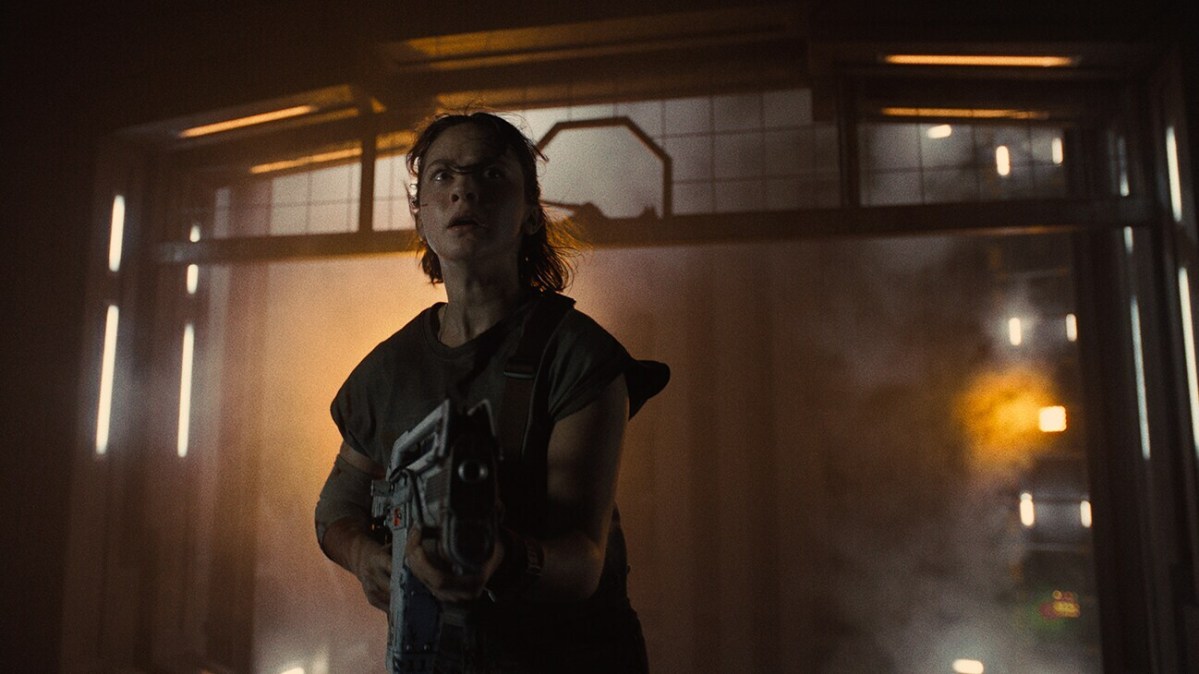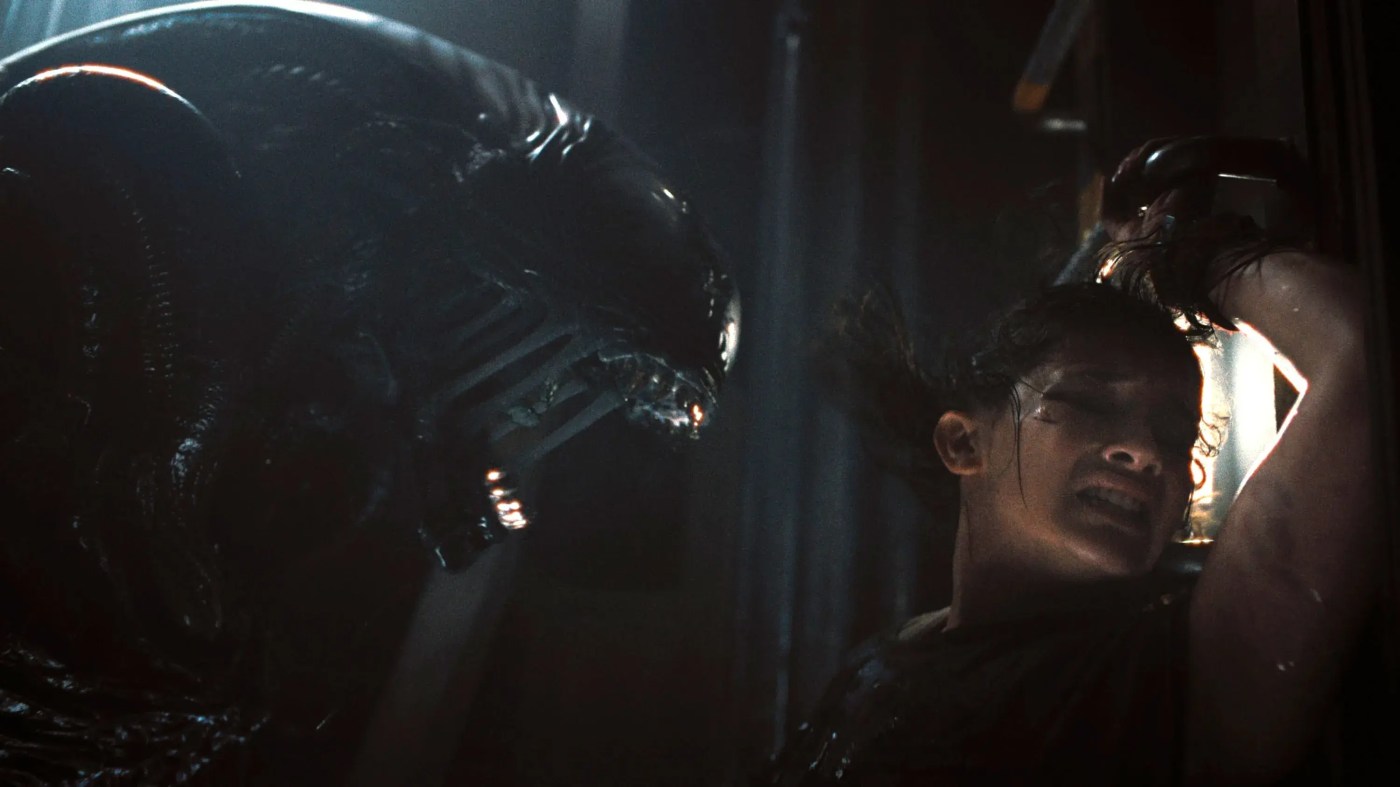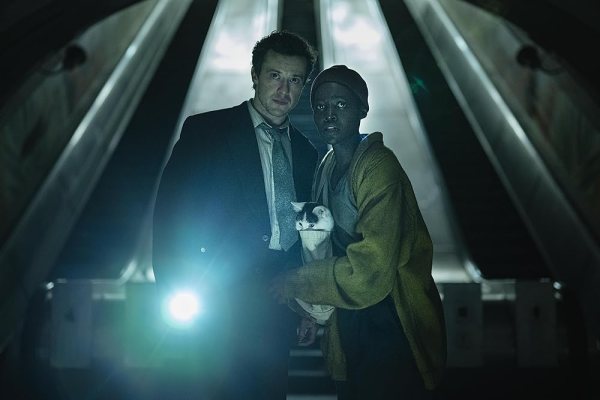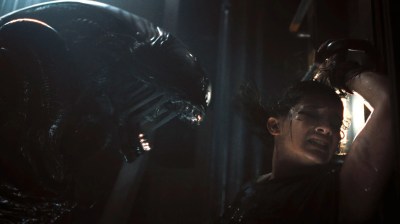After more than four decades of sequels, prequels, and ill-advised crossovers, 20th Century Studios has seemed reluctant to accept that the Alien franchise had lost some of its bite. Ridley Scott’s original horror classic in 1979 permanently changed the alien-movie landscape with his dark masterpiece of tension-building. But by the 2010s, Scott’s Alien movies were much more concerned with reveling in lofty existentialist ideas, tossing aside the original’s simple “what’s-hiding-around-the-corner” horror. Needless to say, audiences weren’t interested.
Now, director Fede Álvarez holds the reins of the franchise, clearly hoping to recapture some old-school sci-fi horror magic in the new Alien: Romulus. Álvarez knows some of the ingredients of a good Alien movie—he’s got a spunky female lead, aliens hatching out of eggs, and lots of ’70s-looking computer screens—but he misses what actually made the 1979 film a classic. Álvarez’s film looks like Alien, but it doesn’t feel like it.
Alien: Romulus follows Rain (Cailee Spaeny) and her android brother Andy (David Jonsson), who team up with an unremarkable band of 20-somethings who want to escape from their sunless mining planet run by the ruthless Weyland-Yutani corporation. The downtrodden blue-collar workers are ready to leave their oppressive corporate overlords behind, but they don’t have any Cryopods—tubes that induce hibernation during years-long space journeys—that they’ll need to escape the planet. Luckily, a decommissioned ship nearby does, and all Rain and her friends have to do is execute an in-and-out heist to steal the pods. What could go wrong? The premise doesn’t really matter—it’s all an excuse to get the gang on a Xenomorph-infested ship.
Once the characters are all on the ship, however, the film starts to hit its stride. While trapped in a locked room and standing in ankle-high water, the crew accidentally unleashes several face-huggers in a gripping sequence that plays like a violent homage to the trash compactor scene from the first Star Wars. From there, the movie’s lethargic scene-setting gives way to a tense, brutal fight for survival across various areas of the ship.
Characters move from one set piece to another, fighting for their lives against hordes of Xenomorphs and face-huggers. Each sequence on its own is creative in its execution and nostalgic in its simplicity, even if none of them are particularly scary. With gorgeous cinematography and an excellent, richly detailed setting aboard the abandoned ship, it’s easy to follow along this Alien-themed roller coaster from scene to scene without feeling bored.
But nothing elevates these scenes to anything more than reminders of better Alien movies. The movie lacks any kind of connective tissue between sequences, and that puts a hard cap on how suspenseful Alien: Romulus can actually be. There are aliens, but there’s no atmosphere or tension. Most plot beats are spins on something in a previous Alien film, and Álvarez doesn’t even attempt to mask them as new ideas. He instead tries to cram in as many of them as possible, making the film feel like a bloated “greatest hits” album.

Ironically, for all its anti-corporate posturing, Alien: Romulus feels like the most blandly corporate entry into the series yet. Alien did slow sci-fi horror; its 1986 sequel Aliens pivoted to frenetic action; and the prequel, Prometheus, explored human existence. And Alien: Romulus? It exists to remind viewers of all those old films while missing what made them so compelling.
The original Alien is more than just a collection of gnarly alien murders—it’s an exercise in both expert pacing and a suffocating tone that takes its time to build suspense before a shocking release. This film is rushed, never keeping its characters in one place for more than a few minutes before pushing them along to their next perilous encounter with the third kind. And each of these encounters feels frustratingly familiar. Nothing in the film comes as a surprise, and clever viewers could probably guess who lives and who dies just from the first act of the movie.
The film’s cast of characters feels just as paint-by-numbers. Each one exists solely because the Xenomorphs need space travelers to kill, and Álvarez can muster only half-hearted attempts at giving his alien-bait believable personalities or characterization before brutally killing them off. It prevents any kind of emotional investment, leaving the audience as passive viewers of a generic sci-fi slasher. It’s partially the fault of the wooden script, packed with self-referential lines like, “This place gives me the creeps!” It gestures vaguely at themes of sentience, humanity, sexuality, and capitalism that the other films explored, but it is uninterested in tackling these questions in any detail, leaving them as baggage to weigh down the plot.
But Romulus takes a turn in its last 15 minutes. As it feels like the movie is winding to a close, Álvarez steers it in a bizarre, disturbing, and refreshingly original direction. It demonstrates a genuinely compelling creativity, and it’s a sign this franchise might have some fresh ideas left. If only there were glimmers of that originality in Romulus’ other 105 minutes.







Please note that we at The Dispatch hold ourselves, our work, and our commenters to a higher standard than other places on the internet. We welcome comments that foster genuine debate or discussion—including comments critical of us or our work—but responses that include ad hominem attacks on fellow Dispatch members or are intended to stoke fear and anger may be moderated.
With your membership, you only have the ability to comment on The Morning Dispatch articles. Consider upgrading to join the conversation everywhere.